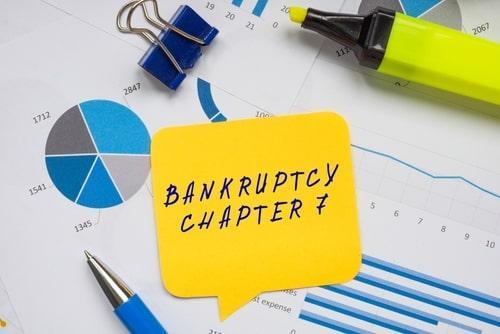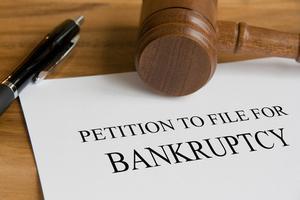Recent Blog Posts
The Means Test: Do I Qualify for Chapter 7 Bankruptcy?
 People with significant debts may qualify for multiple types of debt relief, and in many cases, bankruptcy is the best option. Those who plan to file for bankruptcy will often choose to file under Chapter 7, since this will allow most types of debts to be discharged/eliminated within just a few months. However, debtors will need to meet certain requirements to qualify for debt relief under Chapter 7. One of the most important criteria is the means test, which measures a person’s financial situation to determine whether they have the ability to repay some of their debts.
People with significant debts may qualify for multiple types of debt relief, and in many cases, bankruptcy is the best option. Those who plan to file for bankruptcy will often choose to file under Chapter 7, since this will allow most types of debts to be discharged/eliminated within just a few months. However, debtors will need to meet certain requirements to qualify for debt relief under Chapter 7. One of the most important criteria is the means test, which measures a person’s financial situation to determine whether they have the ability to repay some of their debts.
What Is the Means Test?
The means test is used to determine if you have enough disposable income left over after paying essential expenses related to housing, food, transportation, etc. By looking at your income and expenses, the means test measures whether you have enough money in your monthly budget to repay at least some of what is owed to your creditors. If not, then you may be eligible for a fresh start through Chapter 7 bankruptcy.
What Are the Most Common Reasons People File for Bankruptcy?
 Though no one wants to have to file for bankruptcy, it may sometimes be the best option available. Many Americans face situations where debts become overwhelming, and paying back what is owed while also being able to meet a family's ongoing needs may become impossible. Bankruptcy can be the ideal way to receive relief in these situations, and it can often help resolve debt-related issues before they get worse. By understanding some of the most common reasons people pursue bankruptcy, you can realize that you are not alone and that you have options.
Though no one wants to have to file for bankruptcy, it may sometimes be the best option available. Many Americans face situations where debts become overwhelming, and paying back what is owed while also being able to meet a family's ongoing needs may become impossible. Bankruptcy can be the ideal way to receive relief in these situations, and it can often help resolve debt-related issues before they get worse. By understanding some of the most common reasons people pursue bankruptcy, you can realize that you are not alone and that you have options.
Financial Issues That Often Lead to Bankruptcy
The need for debt relief can arise in a variety of situations, including:
-
Job Loss or Reduction in Income - One of the most common reasons people file for bankruptcy is due to a loss of income. This can come in the form of a job loss or a significant reduction in salary. If you lose your job, it can be difficult to make ends meet, especially if you have a family to support. If you have exhausted all other options, such as borrowing money from friends or family or selling possessions, filing for bankruptcy may be your best option.
When Can the Automatic Stay Be Lifted in a Bankruptcy Case?
 Along with the ability to eliminate certain types of debts, one of the key benefits of bankruptcy is the automatic stay. This is an order that is put in place by a bankruptcy court immediately after a debtor files for bankruptcy, and it will force creditors to cease all collection actions during the case. This means that creditors cannot call, email, send letters, or otherwise communicate with a debtor. They cannot proceed with a legal judgment against a debtor, garnish their wages, freeze or seize their bank accounts or other property, or take any other actions in an attempt to collect a debt.
Along with the ability to eliminate certain types of debts, one of the key benefits of bankruptcy is the automatic stay. This is an order that is put in place by a bankruptcy court immediately after a debtor files for bankruptcy, and it will force creditors to cease all collection actions during the case. This means that creditors cannot call, email, send letters, or otherwise communicate with a debtor. They cannot proceed with a legal judgment against a debtor, garnish their wages, freeze or seize their bank accounts or other property, or take any other actions in an attempt to collect a debt.
The automatic stay can provide a debtor with protections and give them some "breathing room" as they address their debts during the bankruptcy process. However, there are some situations where the automatic stay can be lifted. By understanding when a creditor may request an exception to the automatic stay, a debtor can make sure they are prepared to address these issues as they proceed with bankruptcy.
How Long Will Bankruptcy Affect My Credit Score?
 One reason that many people are hesitant to consider bankruptcy is because they do not want their credit score to be negatively affected. This score can play a significant role in your ability to obtain credit or loans in the future, so if you are planning to buy a home or car or make other large purchases, you may worry that bankruptcy will prevent you from doing so. However, if you are considering bankruptcy, it is likely that you are already encountering issues that may significantly lower your credit score, such as missed payments on credit card debts or other bills. Rather than trying to dig your way out of the hole you are in, bankruptcy can provide you with a fresh start, and while your credit score may take a hit, you can begin rebuilding your credit after wiping out some or all of your debts.
One reason that many people are hesitant to consider bankruptcy is because they do not want their credit score to be negatively affected. This score can play a significant role in your ability to obtain credit or loans in the future, so if you are planning to buy a home or car or make other large purchases, you may worry that bankruptcy will prevent you from doing so. However, if you are considering bankruptcy, it is likely that you are already encountering issues that may significantly lower your credit score, such as missed payments on credit card debts or other bills. Rather than trying to dig your way out of the hole you are in, bankruptcy can provide you with a fresh start, and while your credit score may take a hit, you can begin rebuilding your credit after wiping out some or all of your debts.
Time Needed to Rebuild Credit After Bankruptcy
What Are the Bankruptcy Exemptions in North Carolina?
 For people who are struggling with debts, bankruptcy can be a good option. However, many people are hesitant to consider bankruptcy because they worry that they will lose some or all of the property they own. This may be the case in a Chapter 7 bankruptcy, which may require some of a person’s assets to be liquidated so that as much of their debts as possible can be paid off before the debts are discharged. However, when pursuing a Chapter 7 case, there are a number of exemptions that will apply, and they may be able to keep most or all of their assets.
For people who are struggling with debts, bankruptcy can be a good option. However, many people are hesitant to consider bankruptcy because they worry that they will lose some or all of the property they own. This may be the case in a Chapter 7 bankruptcy, which may require some of a person’s assets to be liquidated so that as much of their debts as possible can be paid off before the debts are discharged. However, when pursuing a Chapter 7 case, there are a number of exemptions that will apply, and they may be able to keep most or all of their assets.
Exemptions to Liquidation in Chapter 7 Bankruptcy
If a person has lived in North Carolina for at least 730 days (two years) before filing for bankruptcy, they will be able to claim the exemptions defined in the state’s laws. These include:
-
Homestead exemption - In most cases, up to $35,000 in equity in a person’s home will be exempt. However, an unmarried person who is at least 65 years old may claim up to $60,000 of a house or property that they formerly owned together with a spouse who is now deceased.
What Are the Types of Debts That Can Be Addressed Through Bankruptcy?
 There are many different types of debts that can cause a person or family to experience financial difficulties. In many cases, these difficulties occur because of circumstances that are out of a person’s control. For example, a person who suffers a serious injury or illness may have received multiple different forms of medical treatment, resulting in high medical bills that they are unable to pay. These problems can become even more serious if a person has been unable to work and earn enough income to cover their living expenses while also repaying the debts they owe. Fortunately, different forms of debt relief may be available, including filing for bankruptcy. Those who are considering bankruptcy will need to understand how different debts may be handled and how different types of bankruptcy may be used to provide financial relief.
There are many different types of debts that can cause a person or family to experience financial difficulties. In many cases, these difficulties occur because of circumstances that are out of a person’s control. For example, a person who suffers a serious injury or illness may have received multiple different forms of medical treatment, resulting in high medical bills that they are unable to pay. These problems can become even more serious if a person has been unable to work and earn enough income to cover their living expenses while also repaying the debts they owe. Fortunately, different forms of debt relief may be available, including filing for bankruptcy. Those who are considering bankruptcy will need to understand how different debts may be handled and how different types of bankruptcy may be used to provide financial relief.
Dischargeable and Non-Dischargeable Debts
Filing for bankruptcy can provide some immediate relief from debts through what is known as the "automatic stay." After a bankruptcy petition is filed in court, this stay will go into effect, and it will prevent creditors from taking any actions to collect debts. Any collection activities will be halted during the bankruptcy case, and creditors will be prohibited from contacting the debtor in any way. The debtor will then be able to determine how to handle different types of debts throughout the bankruptcy process.
An Overview of the Means Test
Chapter 7 is used commonly for personal bankruptcies. Chapter 7 is a liquidation bankruptcy. Nonexempt assets of yours will likely be seized to pay creditors, and most of your unsecured debts (debts with no collateral) will be discharged within a matter of months.
Based on these benefits, you can see why Chapter 7 is attractive for many debtors. At its best, bankruptcy gives you a clean financial slate from which you may work diligently to rebuild your credit and finances on a solid foundation. However, not everyone is eligible for a Chapter 7 bankruptcy. To be eligible, you must first pass what is called the means test.
What is the Means Test?
The means test is a formula that figures your monthly income against your debts to determine if your situation warrants a Chapter 7 bankruptcy. The basic tenet is that if you do not bring in enough money per month to even make a dent in your debts, then Chapter 7 is the way to go.
What Bankruptcy Cannot Accomplish
Many people benefit from a well-structured, rightly timed bankruptcy filing. While bankruptcy can give individuals some closure on many different debts and provide a fairly blank slate from which you may build a better financial foundation, there are limits to what bankruptcy can do for you. Knowing these limits is useful in giving people accurate expectations before they file for Chapter 7 bankruptcy.
What Types of Debts Are Not Dischargeable?
In the context of discussing what bankruptcy is not able to do, the most important consideration is the debts that will stay with you even after you have received a discharge in bankruptcy. Here are some common examples of these debts:
-
Student loans. Unfortunately, student loan debt is not eligible for discharge under any bankruptcy except in very rare circumstances - what is often described as an 'undue hardship.'
-
Unpaid tax liabilities. Usually, outstanding tax liabilities may not be discharged in a Chapter 7 bankruptcy unless it is fairly old.
A Brief Overview of the Bankruptcy Trustee's Role
When you decide to file bankruptcy, you will have a trustee assigned to your case. The trustee takes on a number of important tasks and administers your case. Their goal is to assess your circumstances, ensure that you are not hiding property, manage the property in the bankruptcy case, and manage payments.
Who Is the Trustee?
Trustees are appointed by the courts. Trustees are typically accountants or lawyers.
Trustees in Chapter 7 Bankruptcies
In a Chapter 7 bankruptcy, the ultimate goal is a discharge of all qualifying debts. The trustee is expected to be impartial throughout the process. They receive a small fee for their services, as well as a percentage of any property sold. This serves as extra motivation to find property that people who file bankruptcy may try to hide.
After you file your bankruptcy petition, your trustee will review and verify everything. They also have the chance to ask you questions at the meeting of creditors. In many cases, the trustee simply asks basic questions regarding the accuracy of your bankruptcy petition and the information included in it. If anything doesn't line up, they may dig deeper to understand any discrepancies. If they believe you are concealing assets or hiding property, they may even object to your discharge.
A Step-by-Step Guide to the Bankruptcy Filing Process
Maybe you've decided that bankruptcy is the right choice for your family. What's your next step? This step-by-step guide outlines what to expect throughout the bankruptcy process and what your responsibilities are along the way.
Step 1. Discuss Bankruptcy Options with An Attorney
Though you can represent yourself, bankruptcy cases can be incredibly complicated. For that reason, I always recommend that you hire an attorney. Depending on your income level and the amount of debt you have and your assets, you may qualify for a Chapter 7 bankruptcy, which allows for a full discharge of debt without any repayment.
Step 2. Get Your Documentation to Your Attorney
Your attorney will let you know what is needed to proceed with bankruptcy. You will be expected to provide information on your household income, credit card debt, secured debt, assets, and investments. Most attorneys will also need you to complete a questionnaire.


 704-BLOSSOM
704-BLOSSOM

